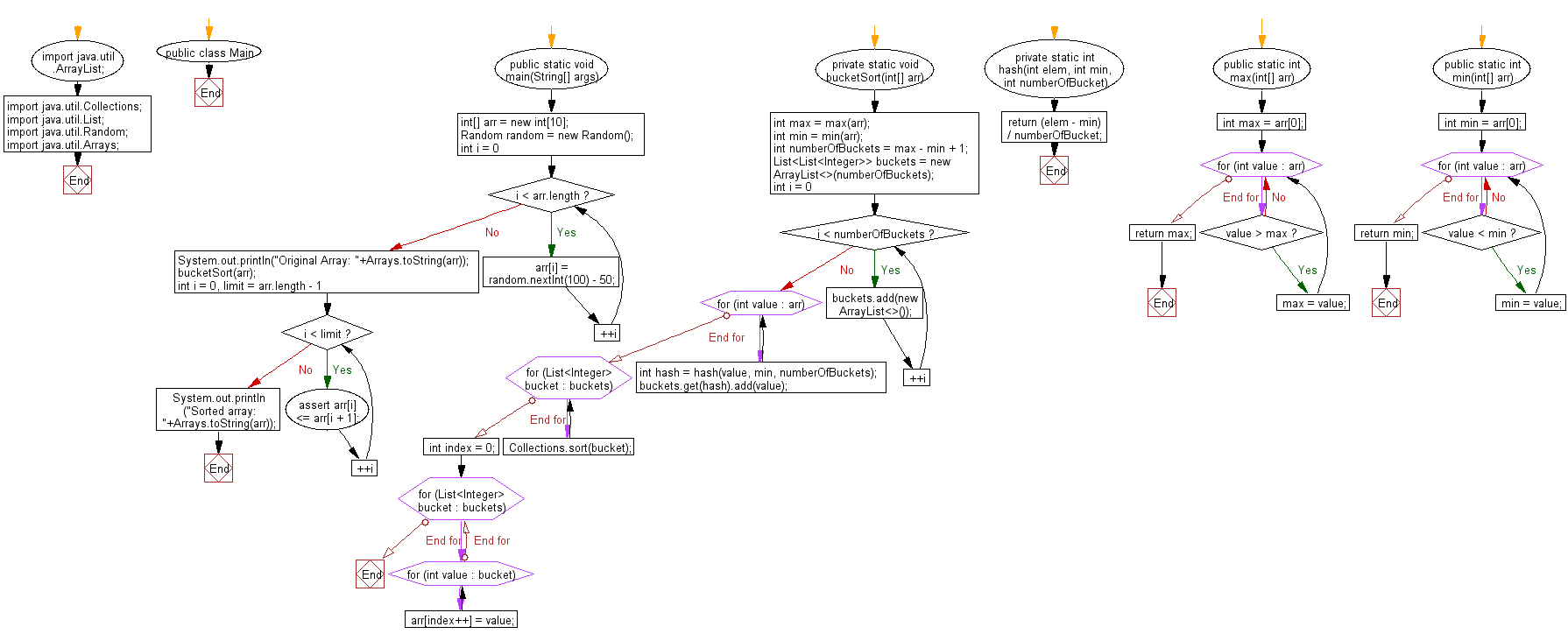Java: Bucket Sort Algorithm
19. Bucket Sort Implementation
Write a Java program to sort an array of given integers using the Bucket Sort Algorithm.
Bucket sort is a sorting algorithm that distributes the elements of an array into a number of buckets. Each bucket is then sorted individually, either using a different sorting algorithm, or by recursively applying the bucket sorting algorithm. It is a distribution sort, a generalization of pigeonhole sort, and a cousin of radix sort in the most-to-least significant digit flavor.
Sample Solution:
Java Code:
import java.util.ArrayList;
import java.util.Collections;
import java.util.List;
import java.util.Random;
import java.util.Arrays;
/*Ref. https://bit.ly/3mAyUj3 */
/** Wikipedia: https://en.wikipedia.org/wiki/Bucket_sort */
public class Main {
public static void main(String[] args) {
int[] arr = new int[10];
/* generate 10 random numbers from -50 to 49 */
Random random = new Random();
for (int i = 0; i < arr.length; ++i) {
arr[i] = random.nextInt(100) - 50;
}
System.out.println("Original Array: "+Arrays.toString(arr));
bucketSort(arr);
/* check array is sorted or not */
for (int i = 0, limit = arr.length - 1; i < limit; ++i) {
assert arr[i] <= arr[i + 1];
}
System.out.println("Sorted array: "+Arrays.toString(arr));
}
/**
* BucketSort algorithms implements
*
* @param arr the array contains elements
*/
private static void bucketSort(int[] arr) {
/* get max value of arr */
int max = max(arr);
/* get min value of arr */
int min = min(arr);
/* number of buckets */
int numberOfBuckets = max - min + 1;
List<List<Integer>> buckets = new ArrayList<>(numberOfBuckets);
/* init buckets */
for (int i = 0; i < numberOfBuckets; ++i) {
buckets.add(new ArrayList<>());
}
/* store elements to buckets */
for (int value : arr) {
int hash = hash(value, min, numberOfBuckets);
buckets.get(hash).add(value);
}
/* sort individual bucket */
for (List<Integer> bucket : buckets) {
Collections.sort(bucket);
}
/* concatenate buckets to origin array */
int index = 0;
for (List<Integer> bucket : buckets) {
for (int value : bucket) {
arr[index++] = value;
}
}
}
/**
* Get index of bucket which of our elements gets placed into it.
*
* @param elem the element of array to be sorted
* @param min min value of array
* @param numberOfBucket the number of bucket
* @return index of bucket
*/
private static int hash(int elem, int min, int numberOfBucket) {
return (elem - min) / numberOfBucket;
}
/**
* Calculate max value of array
*
* @param arr the array contains elements
* @return max value of given array
*/
public static int max(int[] arr) {
int max = arr[0];
for (int value : arr) {
if (value > max) {
max = value;
}
}
return max;
}
/**
* Calculate min value of array
*
* @param arr the array contains elements
* @return min value of given array
*/
public static int min(int[] arr) {
int min = arr[0];
for (int value : arr) {
if (value < min) {
min = value;
}
}
return min;
}
}
Sample Output:
Original Array: [14, -15, 15, 17, 32, -4, 33, -42, 38, -36] Sorted array: [-42, -36, -15, -4, 14, 15, 17, 32, 33, 38]
Flowchart:

For more Practice: Solve these Related Problems:
- Write a Java program to implement bucket sort and distribute the elements into buckets based on a computed range.
- Write a Java program to modify bucket sort to sort floating-point numbers by normalizing them into buckets.
- Write a Java program to implement bucket sort and then merge the sorted buckets into a single sorted array.
- Write a Java program to optimize bucket sort for uniformly distributed data and analyze its average-case performance.
Go to:
PREV : Stooge Sort Implementation.
NEXT : Java Regular Expression Exercises Home
Java Code Editor:
Contribute your code and comments through Disqus.
What is the difficulty level of this exercise?
Test your Programming skills with w3resource's quiz.
